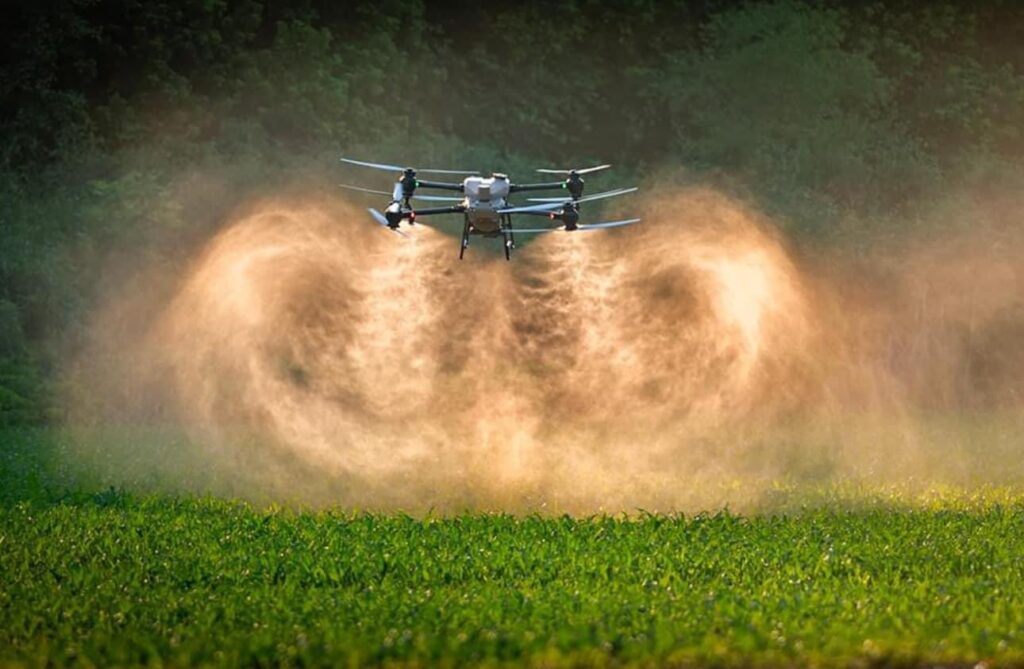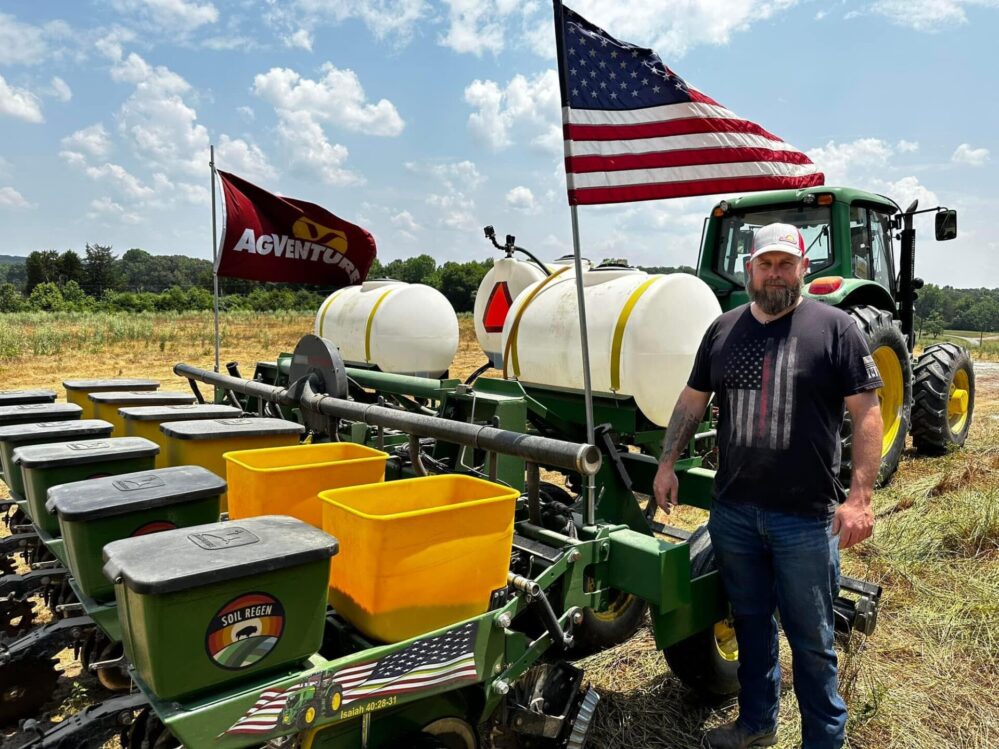“This only came to most people’s attention when it passed in the [US] House [of Representatives], but I can tell you farmers in my state [North Carolina] have been blowing up the phone lines of Senator Budd and Senator Tillis about this,” says Russell Hedrick, a first-generation farmer growing corn and soybeans on a 30-acre farm in Hickory, North Carolina.
Hedrick, who holds his state’s record for soybean yield and the world dryland corn yield record, was speaking to AgFunderNews following last week’s article on proposed legislation targeting Chinese drone maker DJI Technologies, the market leader in ag spray drones in the US.
The Countering CCP Drones Act (HR 2864) would add equipment and services from DJI to the so-called the ‘covered list,’ blocking DJI from getting FCC licenses for future drone models, and potentially leading to the revocation of existing FCC authorizations.
While the bill—which is being driven by Congresswoman Elise Stefanik—was first introduced in April 2023, it has only recently got onto the radar of many farmers after it was tacked onto a defense spending bill that passed in the House on June 14, giving it a sudden surge of momentum. Should similar provisions be added to the Senate version of the bill, and get signed into law, they could come into effect by the end of the year.
‘I had no idea about this until it passed in the House’
According to Hedrick, who uses DJI drones to spray his crops, this could have a huge impact on US farmers: “I had no idea about this until it passed in the House and came to my attention, but if this goes through, it’s going to have a negative impact on agriculture production in the US.”
He added: “If we had American-made drones using American-made parts with American-made software that were as affordable and as good as DJI, we wouldn’t have an issue. But right now, they don’t exist, and I don’t see them existing in the next 5-10 years because we don’t have the capacity and technology to keep up.
“If they are worried abut China, why are they just focusing on DJI? XAG [another Chinese drone maker] also operates in the US, plus you’ve got US drone companies that use Chinese parts or software.”

‘There’s a limit on what ground sprayers can do after a crop reaches a certain maturity’
Hedrick utilizes “multiple different types of DJI drones,” he said. “We use the T40, the T50, a Mavic 3 E for mapping and we do NDVI [Normalized Difference Vegetation Index] analysis so that we apply the appropriate amounts of nitrogen.”
He added: “Initially a local farmer had bought one [a DJI drone] and he sprayed my farm for three years and then last year we invested in the T40s and Mavic 3 Es ourselves and we also plan to help other farmers with their crop production. So we’ve been using them for four years and by far the tech is superior to anything else out there on the market, at least at the moment.
“I think what a lot of people don’t realize is that there’s a limit on what ground sprayers can do after a crop reaches a certain maturity that these drones can then handle, which really increases our crop production.”
As for traditional aerial spraying approaches using planes and helicopters, he said, there are safety concerns, “and they are not as good [as drones]. Airplanes and helicopters do not apply the materials as well as utilizing the prop wash and the vortexes on a spray drone [drones utilize a vortex effect created by the rotor wash to spread out and distribute the atomized liquid].”
‘Everything that could be gotten from the images of a drone our government already freely gives away’
As for security concerns around using DJI drones, he said, “They [supporters of the bill] keep talking about national security, but everything that could be gotten from the images of a drone our government already freely gives away. And not just from the quarterly USDA crop reports, but you can go to the [USDA] Farm Service Agency and just ask for a field map.
“So for example, there’s a military installation here in North Carolina and the whole thing is printed on that map, which is also available on the USDA website. As for the application point of view, China can’t monitor what I’m putting on my crops. I don’t input that.”
He added: “It’s also worth pointing out that there’s never been one confirmed case of a DJI drone being hijacked mid-flight. It’s just fear mongering.”
As to who stands to gain from legislation curbing DJI’s activities in the US, one obvious beneficiary is US-based drone maker Skydio, claimed Hedrick, who noted that Skydio’s director of federal policy used to be national security advisor to Congresswoman Elise Stefanik, who introduced the Countering the CCP Drones Act to Congress. “There are clearly vested interests at play here.”
Asked whether opponents of the bill are overreacting, he said: “The problem is that we don’t know how it will be interpreted as the language is not specific, which creates uncertainty. US farmers have invested hundreds of millions of dollars in this technology and people who have no idea how we raise crops in the US are making decisions that can ultimately affect huge numbers of people.”
DJI: ‘Unfounded allegations and xenophobic sentiments’ should not dictate public policy
In a statement sent to AgFunderNews, DJI Technologies said it was committed to engaging with US policymakers to “ensure that decisions are made based on the quality and safety of our products, rather than the company’s country of origin.” Together with its diverse customer base, said the firm, “we oppose proposed legislation that could severely limit access to vital drone technology, a tool that is integral to their operations and economic success.”
The company added: “The actions taken against DJI suggest protectionism and undermine the principles of fair competition and an open market. The Countering CCP Drones Act risks setting a dangerous precedent, where unfounded allegations and xenophobic sentiments dictate public policy, potentially jeopardizing the economic well-being of the US.
“We don’t have specific market share numbers to provide, but a rough estimate suggests that approximately four out of every five Agras drones utilized by US farmers are DJI models. Based on our current assessment, products with prior FCC authorization will most likely not be affected, if the act is passed. However, FCC does have the authority to revoke prior authorizations for brands that appear on its covered list. At this point, it’s unclear whether they will choose to exercise this right.”
Read more about the arguments for and against the proposed bill here.

















Sponsored
Farmers ‘ready and willing to try’ biological crop solutions. Only ‘strong business models’ need apply